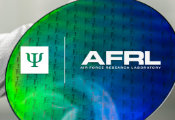Nu Quantum Launches Quantum Datacenter Alliance With Cisco, NTTData, OQC, QphoX, Quantinuum, QuEra
Nu Quantum Launches Quantum Datacenter Alliance With Cisco, NTTData, OQC, QphoX, Quantinuum, QuEra
Nu Quantum has launched the Quantum Data Centre Alliance (QDA) to bring together leading companies representing different layers of the quantum computing stack and create a forum on data centre-scale quantum computers. By collecting complimentary perspectives from across the ecosystem, the QDA presents an open community to discuss the opportunities and challenges on the road to building large, scalable, and robust quantum computing services.
Microsoft’s Majorana 1 Chip Carves New Path for Quantum Computing
Microsoft’s Majorana 1 Chip Carves New Path for Quantum Computing
Microsoft today introduced Majorana 1, the world’s first quantum chip powered by a new Topological Core architecture that it expects will realize quantum computers capable of solving meaningful, industrial-scale problems in years, not decades.
South Korean Chungbuk National University to Install First Quantum Computer IQM Spark
South Korean Chungbuk National University to Install First Quantum Computer IQM Spark
Chungbuk National University (CBNU) today announces the purchase of its first quantum computer from IQM Quantum Computers (IQM), a global leader in designing, building, and selling superconducting quantum computers, aimed at driving quantum research and education programming while preparing students for the quantum workforce.
Riverlane Raises $75 Million to Meet Surging Global Demand for Quantum Error Correction Technology
Riverlane Raises $75 Million to Meet Surging Global Demand for Quantum Error Correction Technology
Riverlane, the global leader in quantum error correction technology, today announced that it has raised $75 million in Series C funding to deliver its groundbreaking quantum error correction (QEC) roadmap. The funding will enable Riverlane to expand operations to meet surging global market demand for QEC technology, with the goal of achieving one million error-free quantum computer operations by 2026.
Quantum Delta NL Expands Strategy With Renewed National Growth Fund Support
Quantum Delta NL Expands Strategy With Renewed National Growth Fund Support
Quantum Delta NL (QDNL), the Netherlands' national ecosystem for quantum innovation, announces that the National Growth Fund advisory committee has approved its updated programming and key performance indicators.
Improving Density Functional Theory One Flaw at Time
Improving Density Functional Theory One Flaw at Time
Density functional theory (DFT) is a cornerstone tool of modern physics, chemistry, and engineering used to explore the behavior of electrons. While essential in modeling systems with many electrons, it suffers from a well-known flaw called self-interaction error. A recent study has identified a new area where a correction for this error breaks down. The research team includes Professor J Karl Johnson and his graduate student Priyanka Bholanath Shukla from the University of Pittsburgh, along with John Perdew, professor and renowned theoretical physicist, and his graduate student Rohan Maniar from Tulane University, and Professor Koblar Alan Jackson from Central Michigan University.
Quantum Interference in Molecule-Surface Collisions
Quantum Interference in Molecule-Surface Collisions
Scientists at EPFL have revealed how quantum interference and symmetry dictate molecular behavior in collisions with gold surfaces, offering new insights into molecular interactions. The findings can have important implications for chemistry and materials science.
High-Throughput Computing and In Situ Technologies Boost Atomic Nanomaterials Development
High-Throughput Computing and In Situ Technologies Boost Atomic Nanomaterials Development
A collaborative research team led by Prof. HUANG Xingjiu from the Hefei Institutes of Physical Science of the Chinese Academy of Sciences (CAS) and Prof. LI Lina from the Shanghai Institute of Applied Physics of CAS, has developed a method to detect harmful heavy metals through a selective catalytic double metal single atom in redox reactions.
Quantistry and Airbus Lead Research in Joint Biocatalysis Project
Quantistry and Airbus Lead Research in Joint Biocatalysis Project
Quantistry, a Berlin-based company shaping the future of materials powered by AI and Quantum, will collaborate with the multinational aerospace corporation Airbus on a joint R&D project. Quantistry and Airbus will be working together over the course of 24 months, leveraging their respective strengths to successfully complete the project.
Germanium Detectors Help ORNL Physicists Unlock the Mysteries of the Universe
Germanium Detectors Help ORNL Physicists Unlock the Mysteries of the Universe
Long at the vanguard of international efforts to answer questions like these, ORNL’s contributions remain strong today. David Radford, head of the lab’s Fundamental Nuclear and Particle Physics section, is an internationally renowned expert in the field who has had an indelible impact on the development of germanium detectors. Vital experimentation tools at the forefront of fundamental physics research, germanium detectors are large, single crystals of germanium — a metallic element — used to detect radiation and enable incredibly precise energy measurements.


























